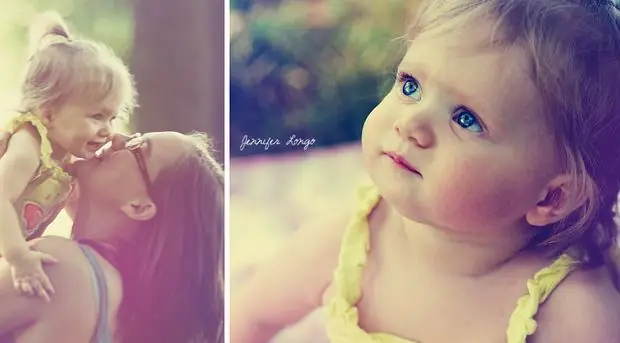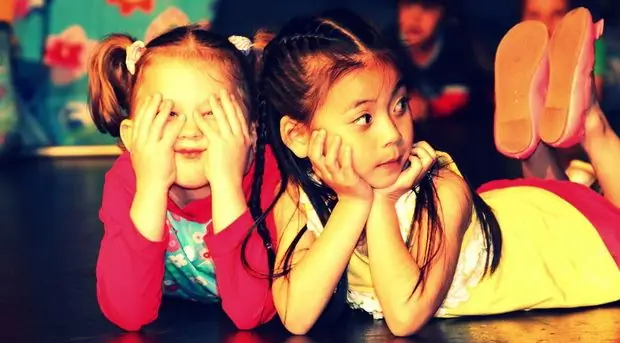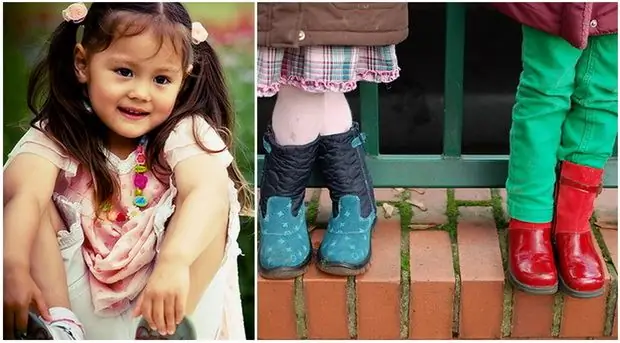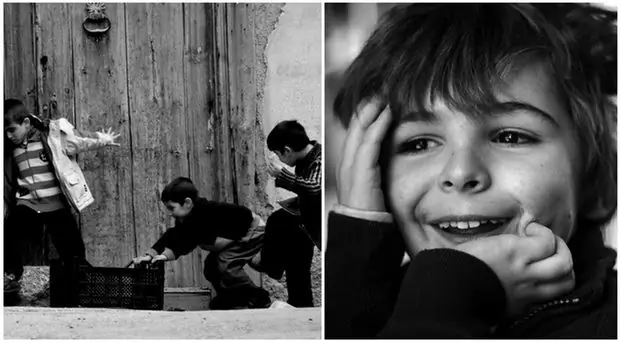- Author Adrian Jeff jeff@psychologosportal.com.
- Public 2023-12-17 05:06.
- Last modified 2025-01-24 14:09.
Adaptation of a child in kindergarten: red pyramids and green balls
At the time when you and I were children, there was an opinion that a child who does not attend kindergarten will certainly face big problems at school: he will not be able to find a common language with teachers and peers, and will also receive a strong blow to immunity. Today this opinion has become less categorical. But in vain …
At the time when you and I were children, there was an opinion that a child who does not attend kindergarten will certainly face big problems at school: he will not be able to find a common language with teachers and peers, and will also receive a strong blow to immunity. Today this opinion has become less categorical. But in vain.
Now every fifth mom is thinking about giving her baby home education, which today can be no worse than kindergarten. The child, the mother believes, does not lose, but only gains: in home education, he is not threatened with this “terrible” adaptation of the child in kindergarten, accompanied by hysterics and constant illnesses; at home he will be given maximum attention and care, and the educational material will be studied in accordance with the individual characteristics of the baby's assimilation of new knowledge. Communication? And this can be organized - to take the child to various sections, to acquaint him with peers in the playgrounds.
From the outside, everything looks great: the baby has no stress, he, as before, is not sick with anything, walks with his mother through the streets, occasionally communicating with his own kind, and also goes to one-hour group lessons three times a week. At school, his knowledge is quite decent, and his mother has no reason to worry about his progress. But this idyll can be spoiled by a single thought that accidentally crept in: "How does he adapt in the school team?.."

Doubt is not unfounded. The role of the kindergarten and the adaptation of children to this preschool institution cannot be overestimated. Not a single mother, even if she hires a thousand nannies, will not be able to teach him the skills of communicating with her own kind, and will not choose his place in society for a child. He must learn all this in the children's team, and the sooner he succeeds, the fewer problems there will be in the future.
The importance of kindergarten
We all have our own specific set of vectors from birth. It does not change over time, it cannot be exchanged or "disabled". The vectors, or our innate properties-desires, can only be developed, and the already developed one can be realized in adult life: a developed visual vector, for example, can be implemented in the medical field, and a developed skin vector - in engineering, and so on. From the underdevelopment of vectors, we get only problems: fears, tantrums, suicidal thoughts, depression, feelings of dissatisfaction, resentment, and much more.
A set of vectors in children is noticeable from a very early age (something is visible from the day of his birth, and some properties are more pronounced by a year or two). They determine the behavior of your baby, his way of thinking, interests and preferences. They also dictate the style of communication with peers. It will depend on them how easy it will be for the baby to adapt in kindergarten.
Why is it so important for children 3-6 years old to communicate with their peers in a kindergarten environment? In their first team, they act independently, without the help of their mother: they themselves try various roles, they themselves find their place in society, they themselves defend their interests. Children are ranked in almost the same way as our ancestors did, only instead of spears and hatchets, plastic spatulas, teeth, and fists are used here.
Do not be alarmed: fights are completely optional. But ranking - yes. Having successfully passed the "exam", the child will find a common language much faster with any children (and then adults) who meet him on the way.

How will the adaptation of the child in kindergarten go?
How the adaptation of a child in the garden will look like depends on his vector set. Some kids easily get used to the new environment, children and teachers, and literally the next day rush to kindergarten. And some have a hard time parting with their mother, home, and their usual way of life.
Clumsy bear
The difficulties of adaptation of children in the nursery group continue to lie in wait for mothers of babies with an anal vector. These are the most homely children attached to mothers, for whom getting used to the garden is a real torment. But parents should know that this torment lasts exactly as long as the baby adapts to the new environment. Having joined the team, he no longer wants to leave - he becomes so good and comfortable in kindergarten. This is his mother, having come running for her "bunny" at the end of the kindergarten day, will be surprised to see how he is carried away by the game and cannot switch to his mother: "Mom, wait, I'll finish the game!" Educators love him for his obedience, and children love him for his kindness.
How can the adaptation period manifest itself in such a child?
On a physical level, almost all children begin to get sick with colds more often. This is normal, as the immune system begins to "fight" the attack of unfamiliar viruses.
Mentally, the child may become more whiny, excitable, and negative emotions may appear. His speech may regress outwardly (the baby begins to use simplified phrases, adjectives and some nouns "drop out" of speech). Also, the child may appear to be severely inhibited. The baby's appetite may be impaired, and sleep may become intermittent and restless.
These are all consequences of stress. They will pass as soon as the baby gets used to the new environment. The adaptation of such children in kindergarten can range from 2-3 weeks to six months.
How can you help such a child get used to it faster? This is where the popular rules for adapting a child to a preschool educational institution from psychologists will come in handy: do not rush, accustom the baby to the garden gradually. In the first three days, bring the child to play on the playground so that he looks around, gets to know the teacher and other children. Do not demand instant sociability from your baby - this, most likely, will not happen.
On the following days, leave the baby with the children and the teacher: first for 20-30 minutes, then for an hour, then for two - and so on. Be sure to return at the time promised to your child. Do everything without sudden movements, gently pushing him to the team, so that the child has time to get used to the idea that he is nowhere without a kindergarten, and so that there are no grounds for his grievances.

Be sure to talk to the teacher: explain to him that your child is leisurely, sometimes frankly slow, and that he may not keep up with the pace of other children. After all, no one knows your child better than yourself. The teacher will take into account the individual characteristics of your baby, organizing the educational process in the group. And the child will not feel flawed.
The following situation will greatly complicate the process: you decided to send the baby to the kindergarten, because your second child was born, and you do not have the time and energy to deal with both. This state of affairs will not please any child, but the little "anal" who still needs a lot of mom's attention can become especially offensive. All this can be avoided by taking the baby to the garden before the second child appears.
Our shot is ripe everywhere
If a child has a skin vector, it will be much easier for him to adapt to new living conditions. In general, it is easy to captivate him with something, because the “leatherman” needs a change of sensations, be it “fresh” toys or new faces around him.
Signs of adaptation of such a child in kindergarten? There will be much less of them: colds, negative emotions (anger, aggression), impaired appetite and sleep. And all this is not at all necessary. The adaptation period for such a child can be one to two weeks.
Teach your baby in advance to the daily routine that is adopted in your future garden. Thanks to this "trick" he adapts to a new place much faster. If you see that a child comes from kindergarten overexcited, hug him and gently stroke his skin - this perfectly calms the little "skinny".
Bully
A child with an urethral vector will survive the period of adaptation in kindergarten without suffering. He will be very comfortable in a large group of children who will secretly choose him as their leader. Such a child will not have any difficulties with getting used to it. But mothers of “urethral patients” need to be careful - these children are not those who unquestioningly submit to pressure from adults, and if the teacher's approach is not flexible enough, conflicts are possible.

What can be done here? Just chat with your caregiver. Explain to him literally on his fingers that it is impossible to subdue or "build" your baby, but it is quite possible to come to an agreement with him. Only not as with a "leatherman" who can be pacified by discipline or the promise of a materialt. And in a special way: to communicate with him as if from the bottom up, as if asking his advice and authoritative opinion. And also to use his heightened sense of responsibility - not for himself, but for his little "flock".
If the teacher does not take your side and does not accept the "rules of the game", he will get another bully and rebel in his group. And the kid, angry with the pressure from the teacher, may completely refuse to go to kindergarten. And nothing can be done about it.
Moon boy
Certain difficulties of adaptation to a preschool institution may arise in the parents of "sound specialists" - children with a sound vector. The quietest, the most thoughtful, these children least of all need (but still need!) In communication. And least of all they want him. They would sit in silence, focusing on their inner world.
However, the mothers of such children definitely need to push them to communicate (again, gently, unobtrusively), because the laws of ranking in society have not been canceled. An unadapted "soundman" in the future can be persecuted and humiliated. And in case of unsuccessful habituation to kindergarten, the baby may develop a severe degree of adaptation, which takes more than six months and is accompanied by various diseases.
How to avoid problems?
As in the case of a child with an anal vector, here you need to train the child's adaptation "mechanisms" in advance: take him to playgrounds, to visit, to entertainment events (but only those that are not accompanied by loud music or noise). Create a favorable psychological environment in your family: talk with your baby, avoid family quarrels and conflicts, listen to quiet classical music with him, play calm games.

Explain to the caregiver in your group that your child does not like loud noises, that he is often immersed in his own world and that harsh educational measures cannot be applied to him. Tell her about what your baby loves to do, and then the chances that she will find an approach to him will be much greater. And your "sound engineer", who has found mutual understanding with the teacher, will soon learn to communicate with peers and will even enjoy it.
These are not all vectors - there are also oral, muscular, visual and olfactory vectors, which also endow the child with individual character traits and behavioral characteristics. You can find out more about them at the trainings on systemic vector psychology by Yuri Burlan. Understanding each of them, you will be able to help your child faster and least painfully go through the adaptation of the child in kindergarten. And also to make the years spent by the kid in this preschool really happy.






